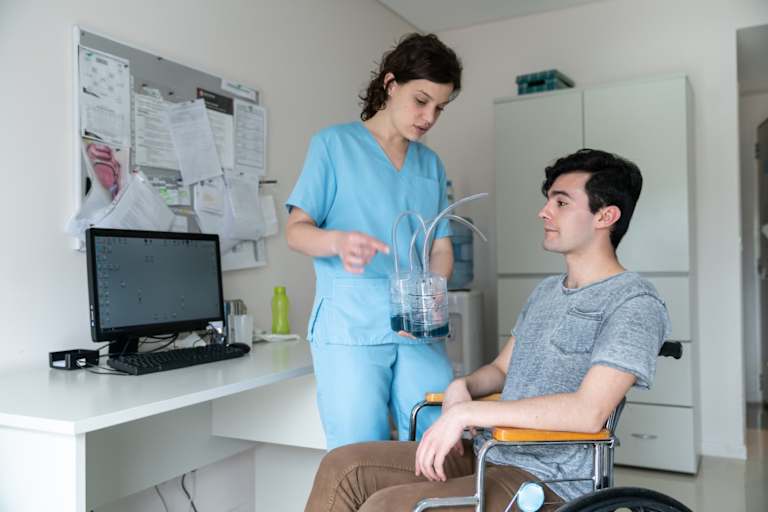Bachelor’s in Respiratory Therapy Program Guide
Portions of the following article were drafted using an in-house natural language generation platform. The article was then reviewed, fact-checked, and edited by multiple members of our editorial team prior to publishing.
Key Takeaways
- A bachelor’s degree in respiratory therapy covers advanced topics like pulmonary physiology, cardiorespiratory assessment, and management.
- Respiratory therapy is a medical field that focuses on illness and treatment related to breathing conditions, like asthma or sleep apnea.
- Graduates can pursue leadership positions, sales roles, and clinical roles.
If you’re considering a career in healthcare and have a particular interest in heart and lung conditions, a respiratory therapy major could be the perfect fit for you.
Even though you only need an associate degree to become a respiratory therapist, earning a bachelor’s degree in respiratory therapy can enhance your career prospects and earning potential. Additionally, the American Association for Respiratory Care (AARC) recommends a bachelor’s-level education for new respiratory therapists to address the complexities of modern healthcare.
This article will guide you through what a bachelor’s in respiratory therapy program entails, your job prospects after graduation, and the potential salary you can expect. Let’s dive in!
What Is Respiratory Therapy?
Respiratory therapy is a healthcare field dedicated to helping patients who have trouble breathing due to various conditions. Respiratory therapists (RTs) use machines like CPAP and BiPAP devices, oxygen concentrators, and mechanical ventilators to assist with breathing and manage respiratory conditions.
As a respiratory therapist, you’ll be on the front lines, working with doctors to treat patients from infants to the elderly. Your responsibilities will span from diagnosing lung or breathing disorders and managing equipment to educating patients and their families about their conditions.
What Will I Learn in a Respiratory Therapy Bachelor’s Program?
A respiratory therapy bachelor’s program combines rigorous academic study with practical clinical experience. Compared to associate respiratory therapy programs, bachelor’s programs provide a more in-depth curriculum around health promotion, education, leadership, and policy studies. Most programs take about four years of full-time study to complete.
This time frame includes both classroom instruction and hands-on clinical internships, which form a critical part of the program and offer invaluable real-world experience. If you already have an associate degree, you may be able to transfer your credits toward your bachelor’s degree program and shorten your overall time in school.
Bachelor’s degrees also offer specialized tracks for further career development, which may lead to more job opportunities and higher earning potential over time. Some areas of respiratory therapy you can specialize in include:
- Neonatal or pediatric
- Geriatric
- Pulmonary rehab
- Critical care
- Pulmonary diagnostics
Courses You Can Expect to Take in a Respiratory Therapy Program
Cardiorespiratory Physiology
This course provides a detailed understanding of the cardiovascular and respiratory systems’ physiological processes.Cardiorespiratory Assessment and Patient Care
Learn to evaluate and provide care for patients with cardiorespiratory disorders.Advanced Pulmonary Physiology and Pathophysiology
This advanced course delves deeper into the functioning and diseases of the respiratory system.Data Management
Understand the importance and methods of managing healthcare data efficiently.Managing in Clinical Settings
Learn to oversee operations and ensure quality care within clinical environments.Resource Utilization
Gain insight into the efficient use of resources within a healthcare setting.
What Can I Do With a Bachelor’s in Respiratory Therapy?
Graduating with a bachelor’s in respiratory therapy opens a myriad of career opportunities. From clinical roles to positions in sales and management, a respiratory therapy major can provide you a promising career path with diverse work settings.
You could work as a general respiratory therapist in a hospital or clinic or transition into sales roles for medical devices. There’s also scope for higher-level positions such as disease manager, case manager, or respiratory care educator.
With further certifications and education, you could also explore specialized roles as a registered pulmonary function technologist, neonatal/pediatric respiratory care specialist, or sleep disorders specialist.
Continuing Education
Earning a bachelor’s in respiratory therapy not only prepares you for immediate respiratory therapist roles but also paves the way for continuing education opportunities. Many respiratory therapists pursue further education and advanced degrees to enhance their career opportunities.
You might consider pursuing a master’s degree in respiratory therapy, which could lead to advanced roles such as a clinical specialist or respiratory care director.
Respiratory Therapist Salary and Job Outlook
As a respiratory therapy graduate, you can expect to earn a competitive salary. According to the Bureau of Labor Statistics (BLS), the median salary for respiratory therapists was $77,960 as of May 2023. However, your location and experience can significantly impact your earnings. For instance, respiratory therapists in California earned a median salary of $103,060.
Median Annual Respiratory Therapist Salary
Lowest 10% of RTs
$59,180
Median Salary for RTs
$77,960
Top 10% of RTs
$104,480
Are Respiratory Therapists In Demand?
Yes, respiratory therapists are in high demand. According to the BLS, the overall employment of respiratory therapists is projected to grow 13% from 2022-32, which is much faster than the average growth of all other occupations.
Factors such as an aging population, increasing chronic respiratory conditions, and the lingering impacts of the COVID-19 pandemic are contributing to this demand. This growing need ensures job security and numerous opportunities in the field.
Is a Bachelor’s in Respiratory Therapy Worth It?
A bachelor’s in respiratory therapy degree can be a worthwhile investment as it offers long-term career and financial benefits, including preparation for leadership roles and specialized areas. Plus, the field is moving towards a bachelor’s degree as the standard, and many employers now prefer bachelor’s-degree holders for management, education, and specialized respiratory therapy positions.
While the job does present some challenges, such as long hours, physical demands, and high stress levels, the benefits can outweigh these. High job demand, competitive salary, diverse work settings, and the satisfaction of making a significant difference in patients’ lives can make it a rewarding career path.
Frequently Asked Questions About Respiratory Therapy Programs
To become a licensed respiratory therapist, you need a minimum of an associate degree in respiratory care/therapy. After completing the degree, you must pass certification exams and obtain state licensure.
However, more employers are favoring candidates who have a bachelor’s degree, so it is increasingly becoming the preferred path.
Explore More College Resources

How to Become a Respiratory Therapist
Interested in a career as a respiratory therapist? Find out how to become a respiratory therapist, how long it takes, and what the training entails.

by Tyler Epps
Updated March 29, 2024



